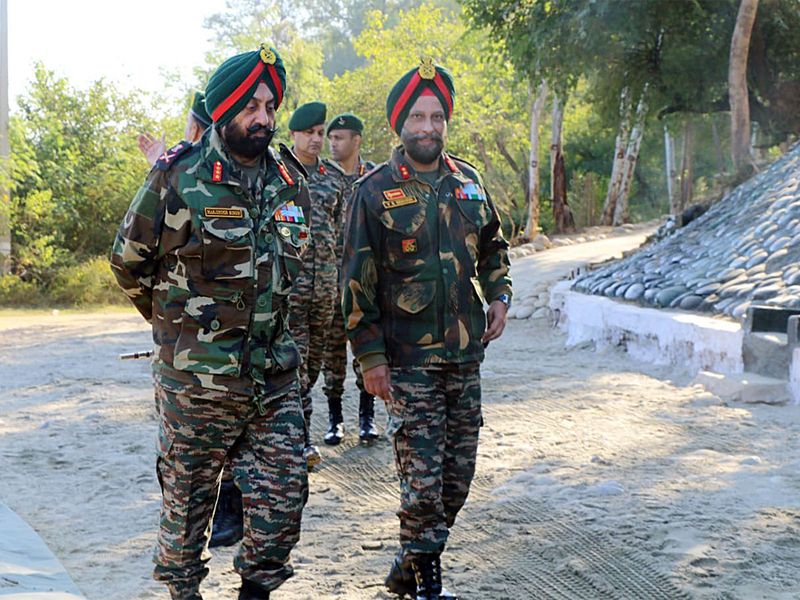Listen to the article
Indian Authorities Uncover AI-Generated Deepfake Video Targeting Military Leadership
The Press Information Bureau (PIB) Fact Check unit has exposed a sophisticated disinformation campaign involving a doctored video of Lieutenant General Manjinder Singh, Commander of the South Western Army. The fabricated footage, which has been circulating across social media platforms, falsely portrays the high-ranking military official making politically charged statements critical of the Indian Army’s operations.
According to the PIB investigation, Pakistani propaganda accounts are behind the distribution of this deepfake video, which has been digitally manipulated using artificial intelligence technology. The altered footage falsely depicts Lt Gen Singh describing military exercises as “political optics to boost the image for the Bihar elections” and contains fabricated statements suggesting the Army was being used as a political tool.
“We all know these so-called threshold exercises are being pushed for optics to boost the image for Bihar elections,” the manipulated video shows Lt Gen Singh saying. “Remember we serve India, not any party. Our duty is to defend the nation, not to become props in political theatre.”
The PIB has categorically denied the authenticity of these statements, confirming that Lt Gen Singh never made such remarks. The agency has released the original, unaltered video to counter the misinformation campaign.
In the authentic footage recorded in Bikaner, Rajasthan, Lt Gen Singh actually discusses the Indian Army’s strategic readiness and modernization efforts. “The Indian Army is following the political direction of the ‘New Normal,’ under which any terror act on the country will be considered an ‘act of war,'” he states in the original recording. “The military has to prepare for any such activities. A lot of technologies and capabilities have been introduced for this.”
The commander also highlights the Army’s enhanced training regimen, noting: “Our focus is on maximum night training; hence, we are carrying out 70% of the training at night and 30% during the day.”
This incident represents a concerning development in the use of deepfake technology for international disinformation operations. Military experts point out that such sophisticated manipulation of video evidence marks a significant escalation in information warfare tactics between India and Pakistan, which have long engaged in media battles alongside their territorial disputes.
The timing of the deepfake’s release coincides with the upcoming Bihar state elections, suggesting an attempt to influence domestic Indian politics through military controversies. Security analysts note that such tactics align with broader efforts to create divisions between India’s military establishment and civilian leadership.
This case highlights the growing challenge of deepfake technology in undermining institutional trust. Cybersecurity experts warn that as AI technologies become more accessible, detecting such manipulations becomes increasingly difficult for average social media users.
The PIB has urged citizens to exercise caution when consuming and sharing content online, particularly involving senior officials or sensitive national security matters. “This AI-generated fake video is being circulated to mislead people and create distrust against the Indian Armed Forces,” the PIB stated in its fact-check report.
Indian defense officials have expressed concern that such targeted disinformation campaigns could potentially undermine public confidence in the armed forces and create unnecessary tensions during sensitive political periods.
The incident underscores the evolving nature of information warfare in South Asia, where traditional military posturing is increasingly complemented by sophisticated digital manipulation campaigns designed to influence public opinion and destabilize institutions.
Authorities are reportedly investigating the source of the deepfake video to identify the specific actors behind its creation and distribution.
Verify This Yourself
Use these professional tools to fact-check and investigate claims independently
Reverse Image Search
Check if this image has been used elsewhere or in different contexts
Ask Our AI About This Claim
Get instant answers with web-powered AI analysis
Related Fact-Checks
See what other fact-checkers have said about similar claims
Want More Verification Tools?
Access our full suite of professional disinformation monitoring and investigation tools




8 Comments
Attempts to politicize the military through fabricated content are deeply troubling. I hope the Indian authorities can effectively expose and shut down these propaganda efforts originating from across the border.
Agreed. Maintaining the integrity and apolitical nature of the armed forces is critical for national security. Debunking such disinformation is an important step in protecting democratic institutions.
This is a timely reminder of the need for robust media literacy and critical thinking skills to navigate the increasing prevalence of deepfakes and other forms of online manipulation. Fact-checking remains a vital bulwark against the erosion of truth.
While the sophistication of these AI-powered disinformation campaigns is concerning, I’m reassured to see the Indian government’s fact-checking unit exposing the manipulated video and its origins. Maintaining public trust is crucial during these times.
Absolutely. Transparent and authoritative fact-checking is essential to counter the spread of such deceptive content, especially when it involves sensitive national security issues.
The use of AI to generate convincing deepfake videos is an alarming development. I’m glad the PIB was able to swiftly identify and refute this particular piece of propaganda targeting the Indian military leadership.
It’s concerning to see disinformation campaigns using AI-generated deepfakes to spread false narratives. We must remain vigilant and rely on authoritative sources to verify information, especially around sensitive military and political issues.
Absolutely. The use of deepfakes to manipulate video footage is a growing threat that undermines public trust. Rigorous fact-checking by reputable outlets is crucial to counter these deceptive tactics.